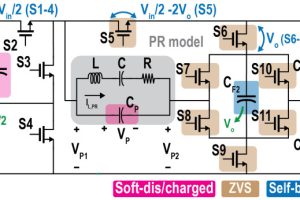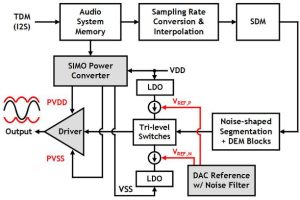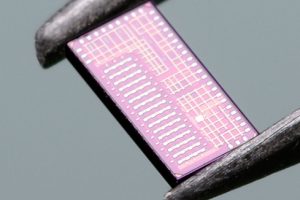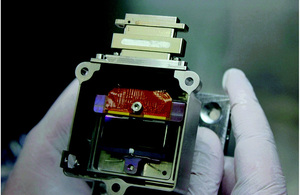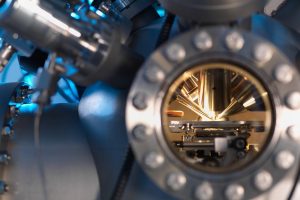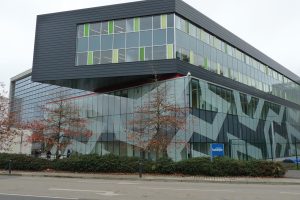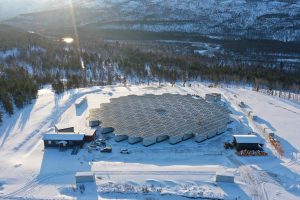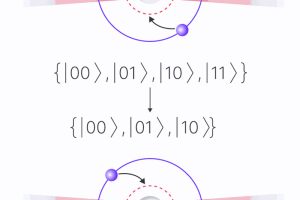Despite there potential efficiency, piezoelectric power converters are a technology that has never become popular, even though the power transfer component is thin and flat, instead of boxy like an inductor, and piezoelectrics are quick and simple to make – much like a ceramic capacitor. The flip-side are the disadvantages, warranting a mushrooming component count to temper them. Enter the ...
Research
The latest electronics research news from within the industry and universities from around the world.
ISSCC: Audio amplifiers and ADCS
International Solid-State Circuits Conference in San Francisco always seems to make space for audio amplifier developments, and this year is no exception, with some extraordinary distortion and noise figures from Class-D amplifiers, plus a sophisticated Class-H scheme to improve headphone amplifier efficiency. Starting with that headphone amplifier: Class-H is a way to decrease the dissipation of an analogue output stage ...
ISSCC: Steerable ultrasound energy beam powers on-brain electronics
Implants that push into the surface of the brain to gain electrical access to neurons have to be connected to the outside world somehow. Thin umbilical cables to the scull tend to be the answer. These cables need to be very flexible as the brain is fixed within the skull, but rather ‘floats’ in liquid (cerebrospinal fluid – ‘CSF’) within ...
UK funds science projects for Moon, Mars and Venus
The UK is funding scientists and engineers to work on a series of international space science and exploration projects involving the Moon, Mars and Venus. The UK Space Agency (UKSA) has announced the allocation of £7 million under the Space Science and Exploration Bilateral Programme. The seven projects involve the universities of Aberdeen, Cambridge, Leicester (twice), Royal Holloway, Sussex and ...
Why new blue OLEDs die young
Next-generation blue OLED materials degrade early mainly due to the loss of oxygen in molecules at the interface between emission and electron transport layers, according to the UK’s National Physical Laboratory, which teamed up with the Samsung Advanced Institute of Technology to pull OLED junctions apart in minute detail. “The presence of these degradation molecules correlates negatively with the blue ...
EW BrightSparks 2023: Sam Jones, Lancaster University
Now in its sixth year of awards, EW BrightSparks sees Electronics Weekly highlight and celebrate some of the brightest and most talented young engineers in the UK today. Here, in our series on the latest EW BrightSparks of 2023, we highlight Sam Jones, a PhD student at Lancaster University. Achievements Sam is an EPSRC-ICASE PhD student in the Physics Department ...
£11m each for Bristol and Southampton universities
Bristol and Southampton universities have received £11m each in government funding for research into semiconductor technologies under the government’s £1 billion support scheme for the UK semiconductor industry. Southampton will focus on silicon photonics. The support will “unite leading UK entrepreneurs and researchers, together with a network of support to improve the commercialisation of semiconductors and deliver a step-change in ...
UK Space Agency joins EISCAT international space observatory
The UK Space Agency (UKSA) has signed an agreement to join EISCAT, the international space observatory. And it has also announced £5.5 million financial backing for Arctic research. EISCAT operates four radar sites across Norway, Sweden and Finland, and it studies the ionosphere, the outermost layer of Earth’s atmosphere which forms the boundary with outer space. It is also the ...
NQCC to get QuEra neutral atom quantum computer
QuEra Computing is to provide the UK’s National Quantum Computing Centre (NQCC) with an error-corrected neutral atom quantum computer as part of NQCC’s £30m programme to gather six different prototype quantum computers. It is expected to be operating early in 2025. In this case, the neutral atoms are rubidium, manipulated by laser optical tweezers and also operated by laser – ...
£30m for prototypes at the UK National Quantum Computing Centre
Quantum Motion is to build a quantum processor test bed for the UK’s National Quantum Computing Centre (NQCC) at the Rutherford Appleton Laboratory in Oxfordshire. The prototype system “will be based on the same silicon MOS platform used throughout the consumer electronics industry today, while the test bed forms part of NQCC’s vision to enable the UK to solve some ...
 Electronics Weekly Electronics Design & Components Tech News
Electronics Weekly Electronics Design & Components Tech News
